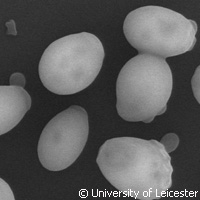Genetic research offers hope of improved treatment for Huntington's disease
Research led by the University of Leicester in the UK has raised hopes about possible new treatments for devastating neurodegenerative disorders such as Huntington's disease, for which there is currently no cure. The trans-Atlantic team of scientists made the discoveries using cutting-edge genetic techniques. The study was partially funded by a Marie Curie grant under the EU's Seventh Framework Programme (FP7), and has been published in The Journal of Biological Chemistry. The Leicester researchers, along with colleagues at the University of Lisbon in Portugal and the University of California at San Francisco (UCSF) in the US, used baker's yeast to examine the different aspects of Huntington's disease. Scientists have used Baker's yeast in recent years to study mechanisms underlying disease pathology, identifying several promising candidate drug targets for neurodegenerative disorders. Dr Flaviano Giorgini from Leicester's Department of Genetics explains how his group used 'simple, yet powerful genetic organisms such as baker's yeast and fruit flies to model aspects of these devastating diseases'. He notes that 'by clarifying the genes and cellular pathways involved in these diseases we hope to identify novel strategies for treatment and therapy of these disorders'. Huntington's is an inherited disease that damages the nerve cells in the brain, causing deterioration and gradual loss of function of areas of the brain. This affects movement, cognition (i.e. perception, awareness, thinking, judgement) and behaviour. While medication can be used to manage some of the symptoms of the disease, and various therapies such as speech and language, and occupational can help with communication and day-to-day living, there is no cure for Huntington's disease and its progress cannot be reversed or slowed down. UK studies have found that between 6 and 7 people per 100,000 are affected by Huntington's disease, although scientists suspect that the true figure is much higher. Dr Giorgini said the researchers 'used a novel functional genomics profiling approach to identify genes which can protect these simple organisms from disease symptoms'. They later employed 'computational approaches to uncover a network of interactions among these genes, which has shed light on the mechanisms underlying this disorder'. This approach revealed that many of the protective genes are involved in translation - a cellular process in which messenger Ribonucleic acid (mRNA) is decoded by the ribosome to produce specific proteins. According to the scientists, this is particularly intriguing as it is the first time that this process has been implicated in Huntington's disease. It is also important because recent work indicates that pharmacological modulation of translation may represent a promising avenue for the treatment of Parkinson's disease, the researchers pointed out. So this latest research fits together strongly with these observations and suggests that similar drug treatment may be beneficial for Huntington's disease. 'Our research has taken advantage of cutting-edge genomics approaches using a simple model organism to identify a novel area for potential therapeutic intervention for Huntington's disease,' Dr Giorgini says. If these findings were validated by further studies, 'it might suggest a novel therapeutic approach for this devastating disorder - which is critical as currently there are no treatments for onset or progression of symptoms', he adds.For more information, please visit: University of Leicester:http://www2.le.ac.uk/The Journal of Biological Chemistry:http://www.jbc.org/
Countries
Portugal, United Kingdom, United States



